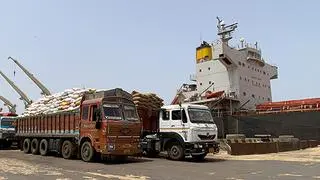It is an exciting time to take up new positions, in business and in government, to grow the trade and investment relationship between India and the UK. Businesses on both sides have an ambitious, enthusiastic approach to the future of economic cooperation. While the shift in global circumstances have unveiled new and unexpected opportunities.
The UK-India partnership is already strong. In 2019, trade between the two countries hit £24 billion, up by almost 10 per cent in just one year. There is also a robust investment relationship, with British and Indian investments supporting over half-a-million jobs in each other’s economies. The UK has been the second-fastest growing G20 investor in India over the last 10 years, driving investments of over £21.48 billion. Even before the coronavirus hit, the UK was India’s second-largest research partner, and joint research will be worth £400 million by next year.
But there is the potential to do so much more. The benefits of this ‘unbeatable combination’ are clear: New jobs, economic growth and new avenues to co-create and co-innovate.
The steps for strengthening this partnership were discussed at the UK-India Joint Economic Trade Committee (JETCO) in July. Both countries agreed to an Enhanced Trade Partnership with a roadmap to a potential free trade agreement (FTA). Now that a deeper trading relationship has been established, the immediate focus is to remove market access barriers and make it easier for both countries to do business with each other.
At JETCO, three business-led working groups covering the healthcare and life-sciences industry, digital and data services sector, and food and drinks sector submitted recommendations to remove market access barriers. Chemicals and services were also cited as areas of mutual interest from a trade perspective. These are priority areas and while considering recommendations represent some progress, the real work arguably starts now. Business-to-government dialogue must continue and both governments must deliver against the recommendations made.
Each sector is an important part of the trading relationship and will only become increasingly so: Medical and pharmaceutical trade contributed £506.24 million to the bilateral trade in 2019; digital and data services £980 million; and food and drinks £723.59 million.
Healthcare and life-sciences : The current pandemic has laid bare the need for all countries to have appropriate healthcare, as well as the importance of international collaboration to share expertise and generate better outcomes for the entire world. That means having the right infrastructure, medical equipment, and medicines to meet demands.
The joint venture between Oxford University, AstraZeneca and Serum Institute of India on a potential vaccine is an example of what the UK and India can achieve together. Likewise, the export of 2.8 million packets of paracetamol and 11 million facemasks from India to the UK underlines that importance of a strong partnership in overcoming challenging circumstances.
Looking to the future, enabling the UK and India to collaborate more effectively, through shared procurement portals, knowledge and training transfer, and standards alignment will certainly benefit both countries.
Digital and data services: We all have a new relationship with technology as a result of the virus. The flexibility that tech has given people to work and socialise in physical isolation has become more valuable than ever. Whether it is the delivery of higher education and advanced skills development, artificial intelligence and machine learning, or in healthcare, data and digital technology have so much potential to benefit both countries. That’s why the UK recently launched the Innovation Challenge Fund for the AI-Data cluster in Karnataka and the Future Mobility cluster in Maharashtra to support scientists in academia and industry to tackle today’s most acute global challenges: Covid-19 and climate change.
Businesses also propose, among other key recommendations, a data adequacy agreement that would allow the free flow of data between the UK and India, subject to protection standards. This could have huge benefits for knowledge and innovation in fields like healthcare and education, and to identify new opportunities.
Food and drink : Making it easier for farmers and businesses to sell their products in both markets is paramount, subject to appropriate standards and regulations like those outlined by the joint working groups. This can open new markets to sellers, increase supply and the variety of quality products available to consumers in both markets, and enable India to collaborate with the UK on technological innovation in cold-chain infrastructure and food processing.
Bringing these business-led recommendations to fruition will be central to boosting the Enhanced Trade Partnership, helping to build momentum for a potential FTA. The UK is establishing a new trading relationship with the world, and coupled with India’s self-reliant mission, there are boundless opportunities for mutual growth and economic enhancement.
The objective is to bring our countries — and businesses — closer, using the unique technology, capability and expertise of both to bring about greater prosperity for all.
Gemmell is Her Majesty’s Trade Commissioner for South Asia and Krishna is the Group CEOr, UK India Business Council








Comments
Comments have to be in English, and in full sentences. They cannot be abusive or personal. Please abide by our community guidelines for posting your comments.
We have migrated to a new commenting platform. If you are already a registered user of TheHindu Businessline and logged in, you may continue to engage with our articles. If you do not have an account please register and login to post comments. Users can access their older comments by logging into their accounts on Vuukle.